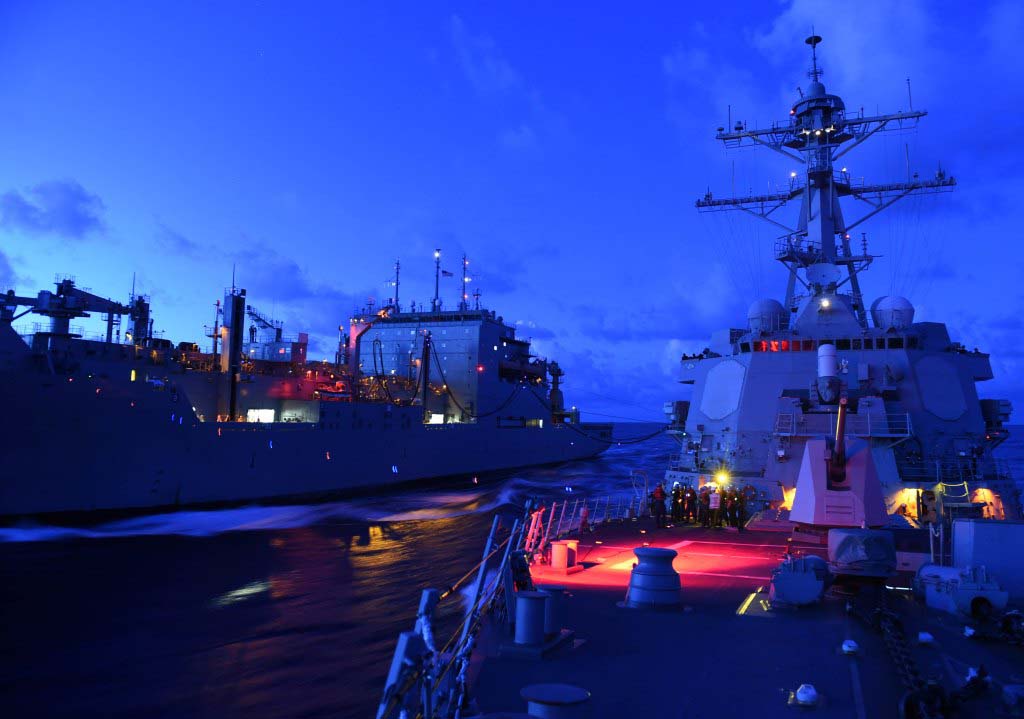
The Navy’s War Versus Bolton’s War NeoCon
June 9, 2019
Michael T. Klare says the Pentagon
{Deep State} is spoiling for a fight, but with China, not Iran.
By Michael T. Klare
The recent White House decision to speed the deployment of an aircraft carrier battle group and other military assets to the Persian Gulf has led many in Washington and elsewhere to assume that the U.S. is gearing up for war with Iran. As in the lead-up to the 2003 invasion of Iraq, U.S. officials have cited suspect intelligence data to justify elaborate war preparations. On May 13, acting Secretary of Defense Patrick Shanahan presented top White House officials with plans to send as many as 120,000 troops to the Middle East for possible future combat with Iran and its proxies. Later reports indicated that the Pentagon might be making plans to send even more soldiers than that.
Hawks in the White House, led by National Security Advisor John Bolton, see a war aimed at eliminating Iran’s clerical leadership as a potentially big win for Washington. Many top officials in the U.S. military, however, see the matter quite differently — as potentially a giant step backward into exactly the kind of low-tech ground war they’ve been unsuccessfully enmeshed in across the Greater Middle East and northern Africa for years and would prefer to leave behind.
Bolton receives command-and-control update from Air Force Gen. John Hyten,
Offutt Air Force Base, Nebraska., Feb. 14, 2019. (U.S. Navy/ Julie Matyascik)
Make no mistake: if President Donald Trump ordered the U.S. military to attack Iran, it would do so and, were that to happen, there can be little doubt about the ultimate negative outcome for Iran. Its moth-eaten military machine is simply no match for the American one. Almost 18 years after Washington’s war on terror was launched, however, there can be little doubt that any U.S. assault on Iran would also stir up yet more chaos across the region, displace more people, create more refugees, and leave behind more dead civilians, more ruined cities and infrastructure, and more angry souls ready to join the next terror group to pop up. It would surely lead to another quagmire set of ongoing conflicts for American soldiers. Think: Iraq and Afghanistan, exactly the type of no-win scenarios that many top Pentagon officials now seek to flee. But don’t chalk such feelings up only to a reluctance to get bogged down in yet one more war-on-terror quagmire. These days, the Pentagon is also increasingly obsessed with preparations for another type of war in another locale entirely: a high-intensity conflict with China, possibly in the South China Sea.
After years of slogging it out with guerrillas and jihadists across the Greater Middle East, the U.S. military is increasingly keen on preparing to combat “peer” competitors China and Russia, countries that pose what’s called a “multi-domain” challenge to the United States. This new outlook is only bolstered by a belief that America’s never-ending war on terror has severely depleted its military, something obvious to both Chinese and Russian leaders who have taken advantage of Washington’s extended preoccupation with counterterrorism to modernize their forces and equip them with advanced weaponry.
For the United States to remain a paramount power — so Pentagon thinking now goes — it must turn away from counterterrorism and focus instead on developing the wherewithal to decisively defeat its great-power rivals. This outlook was made crystal clear by then-Secretary of Defense Jim Mattis in testimony before the Senate Armed Services Committee in April 2018. “The negative impact on military readiness resulting from the longest continuous period of combat in our nation’s history [has] created an overstretched and under-resourced military,” he insisted. Our rivals, he added, used those same years to invest in military capabilities meant to significantly erode America’s advantage in advanced technology. China, he assured the senators, is “modernizing its conventional military forces to a degree that will challenge U.S. military superiority.” In response, the United States had but one choice: to reorient its own forces for great-power competition. “Long-term strategic competition — not terrorism — is now the primary focus of U.S. national security.”